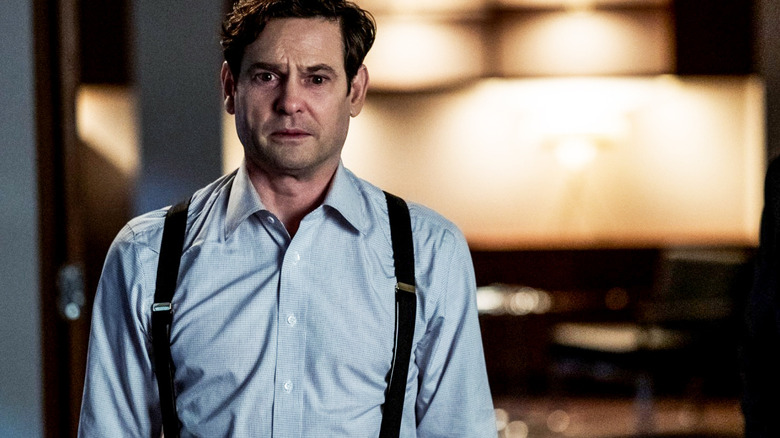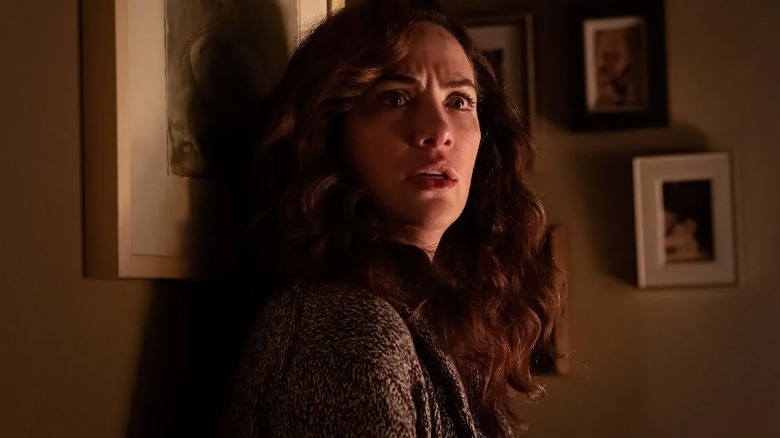Here's Mike Flanagan's Unique Approach To Adapting Edgar Allan Poe's The Fall Of The House Of Usher
Henry Thomas has come a long way since playing Elliott in "E.T. The Extraterrestrial," and he's a staple in multiple Mike Flanagan projects, from "Gerald's Game" to "Ouija: Origin of Evil." Having appeared in all three Netflix limited series by Flanagan — namely "The Haunting of Hill House," The Haunting of Bly Manor," and "Midnight Mass" — Thomas is set to appear in Flanagan's highly anticipated project, "The Fall of the House of Usher."
/Film's Ryan Scott recently interviewed Thomas and asked him how "House of Usher" compares to the other Flanagan Netflix series he's appeared in. All three of the "House" shows are loosely based on a literary work, and Thomas explains how "The Fall of the House of Usher" adapts Edgar Allan Poe's short story of the same name, along with the author's collected works:
"... For 'The Fall of the House of Usher,' it's the collected works of Edgar Allan Poe told out in front of the backdrop of 'The Fall of the House of Usher' ... And then each of the episodes are sort of one, or two, or a conglomeration of short stories by Edgar Allan Poe. And the various characters are based on different characters in the writings and things. But yeah, it's going to be really cool, and it's very darkly comedic ... I think, going to be something that audiences will really get a great kick out of."
Flanagan's "Hill House," though based on Shirley Jackson's novel of the same name, takes the basic premise of the book and introduces fresh characters to weave a moving story about familial grief. Similarly, "Bly Manor," while based on Henry James' "The Turn of the Screw," fleshes out the fates of the characters involved, allowing a more interconnected story to emerge in the process.
A tale of fear, doom, and guilt
Allan Poe's "The Fall of the House of Usher" opens with the narrator visiting his sick friend, Roderick Usher, after he receives a letter from him asking for help. The narrator learns that Usher's sister, Madeleine, has also fallen ill like him, and that Usher believes that the house is somehow sentient. Usher has an eerie premonition of his death being connected to the fate of the mansion, and the narrator finds himself feeling increasingly on-edge as strange things occur over the course of his stay.
While Thomas does not give away much in terms of what Flanagan's adaptation will entail, it does seem like the narrative of "The Fall of the House of Usher" will act as the connecting story to the other Allan Poe tales told in an episodic fashion. As the series boasts a huge ensemble cast, including Mark Hamill playing an unidentified role, Flanagan could be branching out into fresh directions — while still retaining the basic premises of the stories he is adapting from.
This makes sense in terms of Allan Poe's notion of "totality" present in his works, which essentially means that every little detail is relevant, and ties back to the conclusion of the story in an important way. Flanagan might take a similar route, possibly adapting Poe's works that deal with similar themes of guilt, revenge, and impending doom, such as "The Tell-Tale Heart," "The Purloined Letter," and "The Cask of Amontillado." Being an extremely competent horror director, Flanagan might just be able to pull off this ambitious project with stunning results.
A release date for Flanagan's "The Fall of the House of Usher" has not been specified yet. The limited series is set to premiere on Netflix.

